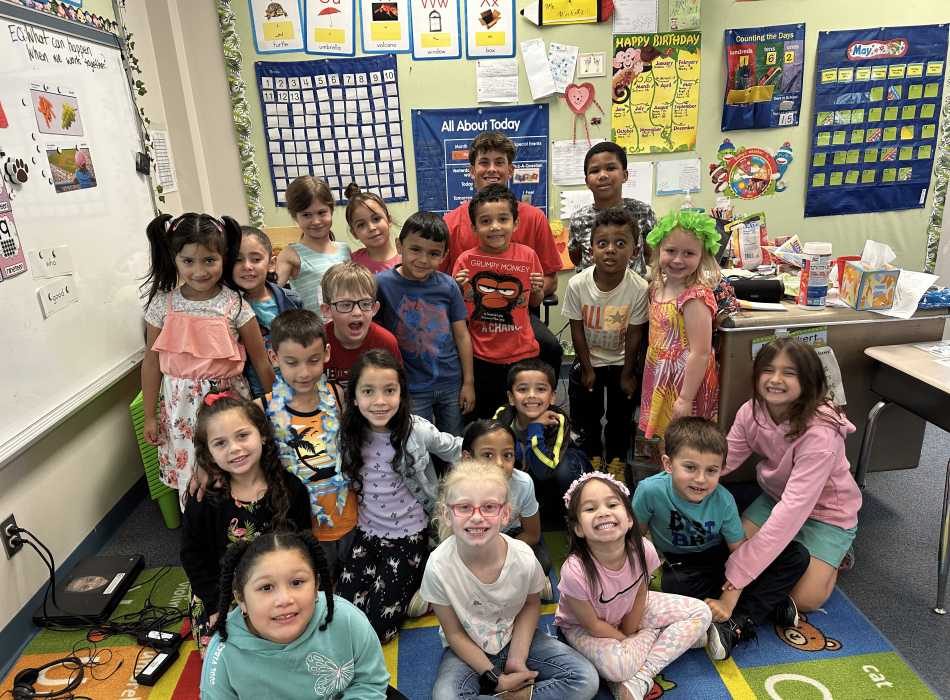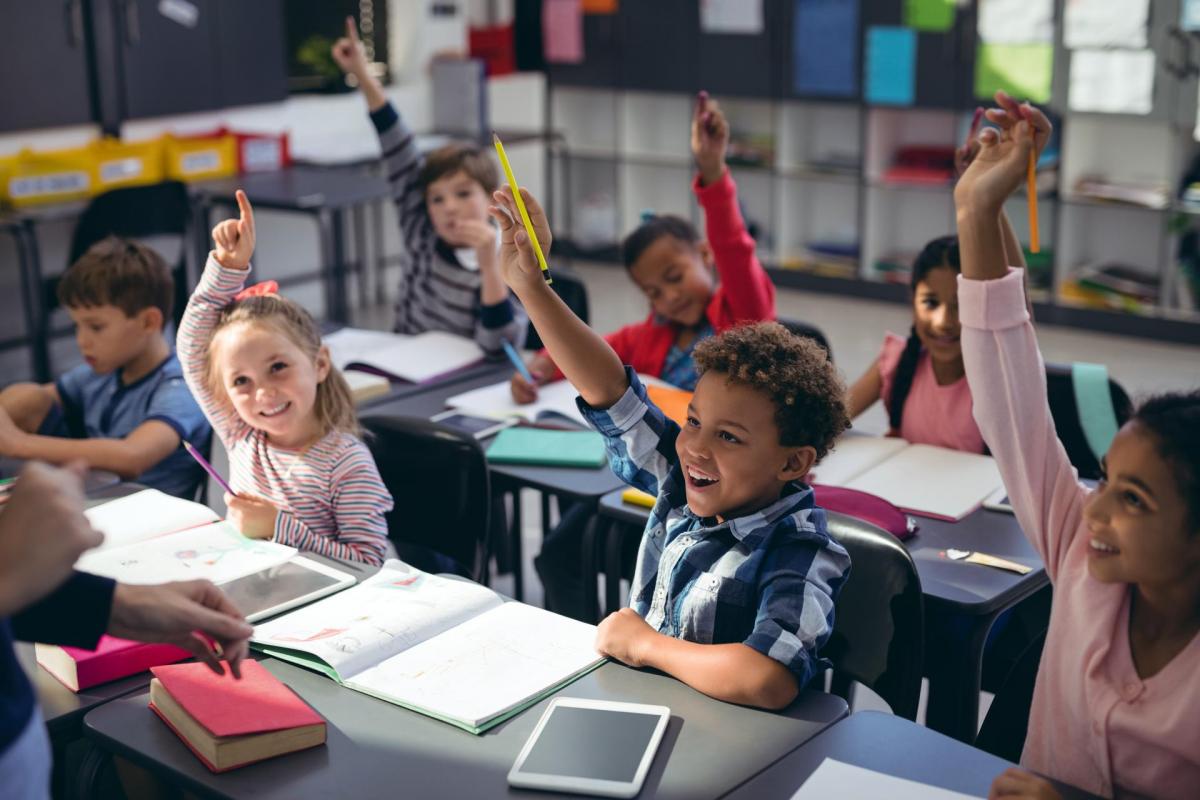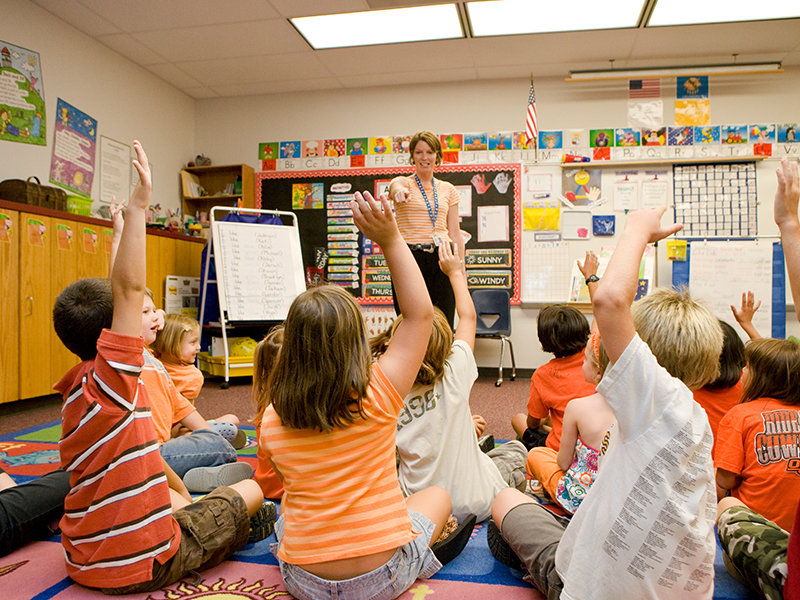Understanding how Grade School bridges early learning to advanced studies
Wiki Article
Everything about Kindergarten: Understanding the Importance of Very Early Youth Education Programs
Preschool serves as a critical point in a youngster's early growth. It introduces fundamental skills essential for future discovering and social interactions. With numerous activities, children take part in organized play that promotes cognitive growth. Comprehending the subtleties of various preschool programs can even more illuminate their significance. What particular benefits do these early education and learning experiences use, and just how do they shape a youngster's trajectory? The responses may be much more intricate than one could anticipate.
The Role of Kindergarten in Child Growth
Although some might view kindergarten just as a changeover stage before formal education, it plays an essential function in youngster development. This fundamental phase promotes essential social, psychological, and cognitive abilities that are essential for long-lasting discovering. In kindergarten, children take part in organized play, which boosts their capability to coordinate, share, and settle problems with peers. These communications prepared for healthy relationships and improved interaction abilities.Additionally, kindergarten introduces children to basic concepts in literacy and numeracy, sparking interest and a love for knowing. Educators lead trainees with activities that advertise analytical and important reasoning, crucial elements of intellectual growth. Moreover, the setting emphasizes regular and structure, aiding kids develop self-control and independence. By concentrating on alternative advancement, kindergarten warranties that youngsters are not only ready academically yet also socially and mentally for the difficulties of future academic undertakings.
Key Advantages of Very Early Youth Education
Early youth education offers countless advantages that can considerably affect a kid's development and future success. Research study indicates that kids that take part in top quality early education programs show enhanced cognitive skills, much better language growth, and improved social skills compared to their peers that do not participate in such programs. These fundamental skills are important as they establish the stage for scholastic success and lifelong discovering.Early education promotes psychological development by providing children with opportunities for cooperative play and dispute resolution, assisting them establish durability and empathy. Furthermore, these programs commonly aid link the void for kids from varied histories, making sure fair access to discovering resources and experiences
Inevitably, spending in early youth education not only benefits individual youngsters yet also adds to more powerful areas, as educated individuals are most likely to involve positively in society and the workforce.
Different Sorts Of Kindergarten Programs
Numerous preschool programs accommodate various instructional approaches and requirements. Full-day options supply prolonged knowing time, while the Montessori approach stresses self-reliance and hands-on experiences. Additionally, play-based learning approaches foster imagination and social skills, showing the diversity in early childhood years education.Full-Day Preschool Options
Lots of parents and instructors recognize the growing significance of full-day kindergarten choices in early childhood education and learning. Full-day programs commonly provide an even more detailed learning experience, allowing children to take part in a variety of activities throughout the day. These choices usually consist of a well balanced educational program that incorporates academic, social, and psychological development. Some areas use typical full-day kindergarten, while others might offer customized programs, such as double language or thematic learning atmospheres. In addition, full-day kindergarten can accommodate functioning moms and dads by aligning institution hours with regular work timetables. Research suggests that pupils in full-day programs frequently show boosted academic performance and social skills contrasted to their peers in half-day settings, making these alternatives increasingly preferred in numerous areas.Montessori Strategy Overview
The Montessori technique is simply one of many educational viewpoints, it has actually gained significant attention for its distinct emphasis on child-led knowing and exploration. Developed by Dr. Maria Montessori, this technique concentrates on promoting self-reliance and self-directed task in kids. Classrooms are normally created to motivate motion and hands-on interaction with products, allowing children to discover at their own pace. Montessori educators act as overviews, facilitating learning through observation instead of straight instruction. This strategy focuses on mixed-age classrooms, advertising partnership and peer understanding. In addition, the Montessori method emphasizes sensible life abilities and sensory activities, assisting kids develop a solid structure in both social and scholastic expertises. Parents typically appreciate the all natural development that this approach supports in their kids.Play-Based Knowing Techniques
Play-based knowing methods are indispensable to countless preschool programs, highlighting the significance of play as a fundamental setting of learning for young children. These strategies motivate expedition, creative thinking, and social interaction, permitting youngsters to participate in hands-on experiences that foster cognitive and psychological growth. Different sorts of play, such as imaginative, positive, and physical play, are utilized to support discovering objectives across subjects like proficiency, science, and math. Additionally, play-based programs usually integrate joint tasks, advertising team effort and interaction skills. Educators observe and guide children during play, making certain that discovering end results are attained while maintaining a happy understanding atmosphere. This approach not just improves scholastic preparedness but likewise grows a lifelong love for knowing, making it a crucial element of very early childhood years education and learning.The Importance of Play in Knowing
A substantial body of research highlights the important duty of play in very early childhood years education, illustrating its profound impact on knowing and advancement. Play works as a crucial device via which little ones discover their setting, develop cognitive abilities, and boost their problem-solving capacities. Engaging in imaginative play enables children to try out different duties and circumstances, cultivating creativity and important reasoning.Additionally, play-based knowing encourages children to involve with products and concepts in a hands-on manner, making abstract concepts extra substantial and reasonable. This experiential understanding technique not only captures youngsters's passion but additionally promotes intrinsic motivation, basic for long-lasting knowing.
With play, children also improve their motor abilities and spatial understanding, preparing for more intricate academic jobs. Basically, focusing on play in very early childhood years education programs is vital for supporting alternative growth, furnishing children with the foundational abilities necessary for their future academic journeys.
Social Skills Growth in Kindergarten
Structure on the foundation developed through play, kindergarten offers as a crucial environment for social skills growth. Throughout this developmental phase, kids take part in structured tasks that motivate communication with peers. Through team tasks, cooperative video games, and shared tasks, they discover important skills such as empathy, problem, and interaction resolution.Educators help with these interactions, directing kids in recognizing social signs and fostering positive partnerships. As youngsters navigate various social situations, they establish a feeling of belonging and learn to appreciate diverse perspectives.
Furthermore, kindergarten supplies chances for kids to exercise turn-taking, sharing, and negotiation, which are important for developing friendships. These experiences not only enhance social capability yet likewise contribute to emotional intelligence. Because of this, the social abilities gotten in preschool lay the groundwork for successful communications in later instructional setups and throughout life. For that reason, the importance of social skills advancement in preschool can not be overemphasized.
Parental Participation in Early Education

In addition, when moms and dads demonstrate a rate of interest in their child's education, it grows a favorable mindset towards learning. When they feel sustained, youngsters are more likely to establish a sense of belonging and inspiration to prosper. Furthermore, parental participation can improve a youngster's psychological well-being, leading to better durability in encountering institution challenges. Subsequently, promoting a joint atmosphere in between home and school is essential for maximizing early instructional experiences and end results.
Planning for the Shift to Primary School
As youngsters approach completion of their kindergarten trip, getting ready for the adjustment to elementary institution comes to be progressively vital. This shift needs mindful planning and support from both instructors and parents. Familiarizing kids with the brand-new environment, routines, and expectations of grade school can relieve their anxiousness and promote self-confidence.
Institutions typically supply positioning sessions that present kids to their future classrooms and educators, cultivating a feeling of belonging. Furthermore, moms and dads can participate in conversations regarding the modifications ahead, stressing the amazing possibilities for learning and social interaction.
Encouraging freedom in daily tasks, such as dressing and adhering to a schedule, can additionally be helpful. Exercising crucial abilities, such as letter recognition and standard mathematics, prepares kids academically for very first grade.
Inevitably, a collective initiative amongst parents, educators, and the neighborhood assures a smoother shift, laying a solid foundation for a successful instructional trip.
Often Asked Questions
What Qualifications Should Kindergarten Educators Have?
Preschool instructors ought to possess a bachelor's level in early childhood education and learning or a relevant area, together with state certification. Added credentials may include specialized training in youngster advancement, classroom management, and effective teaching methodologies.Just how Do I Select the Right Kindergarten Program?
To pick the ideal kindergarten program, one should consider variables like educational program, teaching approaches, course size, teacher credentials, and moms and dad evaluations. Checking out facilities and observing interactions can additionally offer beneficial insights into the program's atmosphere.What Should My Child Learn in Preschool?
In kindergarten, a child ought to find out fundamental abilities such as standard analysis and writing, counting, social communications, analytic, and electric motor abilities. These expertises foster cognitive development and prepare them for future academic difficulties.Are There Age Demands for Kindergarten Enrollment?
Most states need children to be 5 years old by a specific date, typically September 1st, for kindergarten enrollment. Nevertheless, certain age demands can differ, so checking local institution district regulations is crucial.
Just How Can I Support My Youngster's Discovering in your home?
To sustain a youngster's knowing at home, parents can establish a regular, offer engaging academic products, motivate analysis, take part in hands-on tasks, and foster open interaction to support curiosity and important reasoning abilities.Kindergarten offers as a crucial stage in a child's very early advancement. Some may view preschool simply as a changeover stage before formal schooling, it plays a vital function in youngster growth. In addition, kindergarten presents kids to fundamental concepts in proficiency and numeracy, stimulating inquisitiveness and a love for knowing. Play-based learning strategies are important to various kindergarten Private School programs, emphasizing the relevance of play as a fundamental setting of finding out for young youngsters. In kindergarten, a youngster should discover foundational abilities such as standard analysis and writing, counting, social interactions, problem-solving, and motor abilities.
Report this wiki page